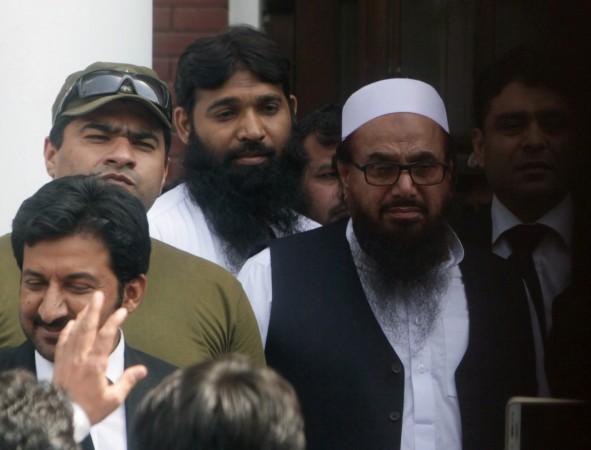
The Interior Ministry of Pakistan on Saturday told a judicial review board that Hafiz Saeed, mastermind of the 26/11 Mumbai terror attack and chief of Jamat-ud-Dawa (JuD), and his four aides have been detained because they were "spreading terrorism in the name of jihad."
Pakistan's Interior Ministry produced him before the judicial review board headed by Pakistan Supreme Court judge Ejaz Afzal Khan and comprising two other senior judges. Saeed told the board that the Pakistan government had detained him to prevent him from raising his voice for the freedom of Kashmiris.
However, the interior ministry rejected his arguments and said that he and his aides were detained becasue they were "spreading terrorism in the name of jihad." This is the first time the Pakistan government has admitted that Saeed was detained because he was spreading terror in the name of jihad. Saeed had been enjoying the support of the country's government since years.
He was allowed to roam around freely in the country and had also publically lead an anti-India rally of his supporters from Lahore to Islamabad on July 19 last year. The Lahore HC had, in 2009, dismissed all terrorism charges against him and set him free despite India having provided evidence of his involvement in the Mumbai terror attacks of 2008, which claimed the lives of 166 people.
On Saturday, the judicial review board asked the interior ministry in Pakistan to submit to it a complete record of the detention of Saeed and his aides. It also asked the Attorney General of Pakistan to be present at the next hearing on May 15.
Saeed chose to present his case himself on Saturday despite his lawyer AK Dogar being present in court. "The allegations levelled by the government against me had never been proved by any state institution. My organisation and I have been victimised for raising voice for freedom of Kashmir and criticising the government's weak policy on the Kashmir issue," the co-founder of Lashkar-e-Taiba (LeT) said.

He also requested the board to set aside his detention order saying that the Pakistan government detained him and his aides under pressure from India and the US after reports emerged that Pakistan might also be included in the US' list of countries that would face visa restrictions/ban. The Pakistan government on Saturday admitted that the "government detained the JuD leaders on pressure of United Nations and international organisations."
This move comes a week after the Lahore High Court's division bench had raised questions as to why Saeed and his aides were not produced before the judicial review board before the government extended his detention by another 90 days, the Press Trust of India (PTI) reported. The Punjab government had extended their detention period on April 30 under the preventive detention under 11 EEE (I) and 11D of Anti-Terrorism Act 1997.
Hafiz Saeed under house arrest
All five of them were placed under house arrest by the Pakistan government on January 30 in Lahore amid protests by Saeed's political allies and party. The country's Interior Ministry identified them as "active members of the Jamaat-ud-Dawa (JuD) and Falah-i- Insaniyat (FIF)." It also ordered the Counter Terrorism Department to "move and take necessary action" against them.
The Fourth Schedule of the Act puts a suspected terrorist under observation making it mandatory for him to register his attendance with the local police daily. Four others added to the list are — Qazi Kashif, Abdullah Obaid, Zafar Iqbal and Abdur Rehman Abid. Saeed and 37 other leaders associated with JuD and FIF have also been placed on the Exit Control List (ECL), which prohibits them from leaving the country and places their assets under scrutiny.
Saeed and his associates had challenged their detention in the Lahore HC in February this year. In their petition to the court, they said that the Pakistan government "has no evidence that we are a risk to security of Pakistan and merely on the basis of the UNSC resolutions our liberty cannot be curtailed." They prayed to the court to declare the government order being mala fide without jurisdiction and void the fundamental right to their life and liberty.










!['Lip lock, pressure, pyaar': Vidya Balan- Pratik Gandhi shine in non-judgmental infidelity romcom Do Aur Do Pyaar [ Review]](https://data1.ibtimes.co.in/en/full/797104/lip-lock-pressure-pyaar-vidya-balan-pratik-gandhi-shine-non-judgmental-infidelity-romcom.jpg?w=220&h=138)






